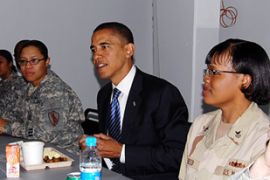Obama meets Afghan president
Presidential candidate holds talks with Hamid Karzai in Kabul after meeting US troops.

James Bays, Al Jazeera’s correspondent in Kabul, said it was likely Karzai would have discussed with Obama a string of Nato offensives where civilians have been killed or injured.
“In the last few days, Karzai went to the scene of an incident where there were civilian casualties at a wedding party in the east of Afghanistan, to console survivors and give compensation from the government. I think civilian casualties will be on the agenda,” he said.
Obama, for his part, has concerns about the quality of leadership in Afghanistan, Bays reported.
“Obama has been critical in the past of Karzai and the Afghan government. This is a government that many in the international community see as having too many corrupt elements to it.”
Call for action
On Saturday, military leaders at the Bagram base north of Kabul, had told Obama and the other senators travelling with him about their efforts to combat Taliban forces and other fighters opposed to the US-backed Afghan government.
| Obama’s foreign policy plan |
|
• Opposes the war in Iraq and will seek to end it as quickly as possible
• Prefers a non-military response to Iran, but does not rule out military reactions and economic sanctions
• Supports a two-state solution to the Israeli-Palestinian conflict and will strengthen US ties with Israel
• Will increase US involvement in Africa to combat poverty and famine
• Seeks stronger action to end genocide in Darfur
• Desires peace agreement in DR Congo
• Seeks stronger relationships with Asian countries such as Japan and South Korea
• Will co-operate with East Asian countries to reach stable and prosperous governments.
• Envisions a “nuclear free world” |
The congressional delegation then met more US soldiers at Jalalabad airfield, as well as the governor of Nangahar province.
Obama has said that Afghanistan is the central front in the so-called “war on terror,” and he is expected to call for more US action to rout the Taliban and al-Qaeda.
Obama has said that if he wins the US presidency in November he will commit at least two more combat brigades – up to 10,000 extra troops – to Afghanistan, while reducing the number of US forces in Iraq.
But the pledge to commit more US troops to Afghanistan is already proving divisive, Bays said.
“Nato commanders and US military commanders have said they they would welcome extra troops. Nato commanders know that American troops are useful to them because they can send them anywhere in the country – many other Nato troops will not send their troops to more volatile areas of Afghanistan.
“But Afghan citizens and Afghan politicians may not want more troops … Many Afghan politicians will tell you that they do not think more troops is necessarily the answer.”
McCain criticism
John McCain, Obama’s Republican rival, has criticised the Democratic nominee’s lack of experience in the region and on Saturday he mocked his current trip.
“Senator Obama announced his strategy for Afghanistan and Iraq before departing on a fact-finding mission that will include visits to both those countries,” he said in a radio address.
“Apparently, he is confident enough that he will not find any facts that might change his opinion or alter his strategy. Remarkable.”
Speaking on the jet before it landed in Afghanistan, Obama said: “I am there to listen, but there is no doubt that my core position, which is that we need a timetable for withdrawal, not only to relieve pressure on our military but also to deal with the deteriorating situation in Afghanistan and to put more pressure on the Iraqi government.”
Obama said that it was time to respect the wishes of Iraq as a sovereign government and start withdrawing troops. A move he said, is in the strategic interests of the US.
German news weekly Der Spiegel quoted Nuri al-Maliki, Iraq’s prime minister, as saying that he backed Obama’s plan to pull out US troops within 16 months if he becomes president.
“We feel that this would be the right timescale for withdrawal allowing for minor adjustments,” he said in the interview to be published on Monday. US forces should leave the country “as soon as possible,” al-Maliki was quoted as saying.
But Ali al-Dabbagh, an Iraqi government spokesman, on Sunday denied that al-Maliki had made such a remark.
Al-Maliki’s comments to the newspaper had been “misunderstood and mistranslated and not conveyed accurately”, al-Dabbagh said.